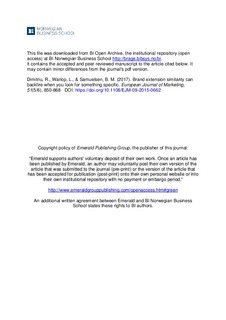Brand extension similarity can backfire when you look for something specific
Journal article, Peer reviewed
Accepted version
Permanent lenke
http://hdl.handle.net/11250/2472875Utgivelsesdato
2017Metadata
Vis full innførselSamlinger
- Publikasjoner fra CRIStin - BI [1015]
- Scientific articles [2181]
Sammendrag
Purpose The purpose of this paper is to show that high similarity between a parent brand and an extension category can have a detrimental effect on how a brand extension is perceived to perform on specific attributes. This happens because similarity influences the perceived positioning of a brand extension: lower similarity extensions can be perceived as “specialized” products, whereas high similarity extensions are perceived as “all-in-one” products not performing exceptionally well on any specific attribute. Design/methodology/approach The authors test the hypothesized effect through three experimental studies. The authors manipulate similarity both within subjects (Study 1a) and between subjects (Study 1b and Study 2). Further, the authors test the effect for specific attributes that are physical/concrete in nature (Study 1a and Study 1b) as well as attributes that are abstract/imagery-related in nature (Study 2). Findings High compared to low similarity improves perceptions of overall performance (i.e. performance across all attributes). But as expected, the authors also find that a high similarity brand extension is perceived to perform worse on the attribute on which a low similarity brand extension specializes, even when the parent brands of the extensions possess that attribute to the same extent. This perception of attribute performance carries on to influence brand extension purchase likelihood. Practical implications The degree of brand extension similarity has consequences for how brand extensions are perceived to be positioned in the marketplace. Although high similarity extensions receive positive evaluations, they might not be suitable when a company is trying to instil a perception of exceptional performance on a specific attribute. Originality/value The authors demonstrate a consequential exception to the marketing wisdom that brands should extend to similar categories. Although the degree of brand extension similarity has been repeatedly shown to have a positive effect on brand extension evaluation, the authors document a case when its effect is actually detrimental. This study’s focus on the dependent variable of perceived performance on specific attributes is novel in the brand extension literature.
Beskrivelse
The accepted and peer reviewed manuscript to the article
